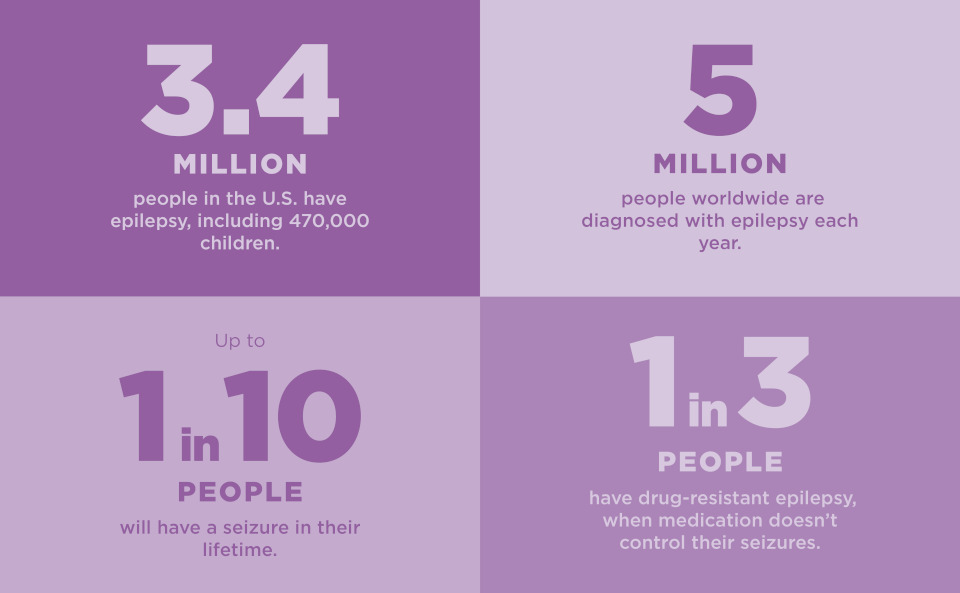Epilepsy Awareness Month 2025
October 14, 2025Reading Time: 5 minutes

Key Takeaways
- November marks National Epilepsy Awareness Month in the United States.
- Multiple resources, including doctor discussion guides, seizure first aid training, and support groups, can help support you or a loved one with epilepsy.
- Events such as Epilepsy Awareness Day at Disneyland Park educate patients and providers about epilepsy innovations and effective treatments.
When is Epilepsy Awareness Month 2025?
November is National Epilepsy Awareness Month in the United States. Epilepsy Awareness Month began in 1969 when the Epilepsy Foundation established November as the month for epilepsy recognition.
Since then, many other organizations have joined campaigns to raise epilepsy and seizure awareness. In 2003, the U.S. Congress formally declared November National Epilepsy Awareness Month.
“To me, bringing awareness to epilepsy is letting people know they’re not alone. It’s an invisible disability and at times, very stigmatized.”
– Tyler
Epilepsy Awareness Events in November
Epilepsy Awareness Day at Disneyland
The Epilepsy Awareness Day at Disneyland 2025 is November 10 – 11, at Disneyland Hotel. NeuroPace’s patient engagement specialist, Mike McKenna, will be at the event to connect with attendees.
This gathering of epilepsy providers and patients will feature over 100 exhibitors and more than 80 presentations on topics such as:
- Dealing with epilepsy when seizure medications don’t work
- How epilepsy and seizures affect the brain, including sleep, memory, cognition, and behavior
- How neurostimulation devices may help
- Making decisions around epilepsy surgery
- Managing epilepsy during childbearing years
- Understanding your electroencephalogram (EEG)
Epilepsy Walks in November
Participate in an Epilepsy Walk near you this November! By participating in an Epilepsy Walk, you’ll be helping to fund vital research, provide support to those living with epilepsy, and spread awareness about this often misunderstood condition.
With walks happening all across the country in November, it’s easy to find a location that works for you. Find a local epilepsy foundation and a walk near you by visiting Walk to End Epilepsy.
What are other epilepsy awareness dates and events?
There are multiple epilepsy awareness dates and events throughout the year, including:
- Purple Day: March 26 is Purple Day, also known as Epilepsy Awareness Day
- Brain Awareness Week: The second week of March
- International Epilepsy Day: Second Monday in February
- Rare Disease Day: The last day of February
- Sudden Unexpected Death in Epilepsy (SUDEP) Action Day: Third Wednesday in October
What is epilepsy?
Epilepsy is a seizure disorder characterized by disturbed nerve cell activity in your brain. This irregular activity causes reoccurring seizures.
Epilepsy can have many different causes; in many cases, there’s no known cause. Epilepsy is common — it affects about 1 in 26 people in the U.S.
Fast facts about epilepsy

- 3.4 million people in the U.S. have epilepsy, including 470,000 children.
- Worldwide, about 5 million people are diagnosed with epilepsy each year.
- Up to 1 in 10 people will have a seizure in their lifetime.
- Seizures can cause symptoms including staring spells, shaking, or loss of consciousness.
- 1 in 3 people have drug-resistant epilepsy, when medication doesn’t control their seizures.
Epilepsy medicines fail to control seizures in nearly one-third of patients. More access to different, targeted, personalized treatments is critical to protect the brain and save lives.
Many people benefit from less invasive approaches, including neurostimulation devices like the RNS System. Take the quiz to find out if the RNS System could be right for you.
“I had 6-7 seizures a day for 3 years and now I’m seizure-free. Awareness means helping people get treatment…. People need to know that epilepsy is very prevalent and that there are treatment options out there.”
– Josh
How to advocate for yourself if you have epilepsy
Advocating for yourself is crucial if you have epilepsy. In simple terms, advocating for yourself means speaking up to your provider, making sure they listen to your preferences, and participating in decision-making.
With the right treatment, you can live a normal life with epilepsy. Some tips to advocate for yourself include:
- Ask your provider for a referral to an epileptologist (epilepsy specialist).
- Use a doctor discussion guide to help you have a more productive conversation with your provider.
- Invite a friend or family member to your medical appointments who can help back you up, if necessary.
- Keep a folder with notes from all your medical visits and treatments that you can refer to as needed.
- Write down your symptoms to discuss with your doctor.
- Request information about other treatment options, including clinical trials.
“It wasn’t until after I was diagnosed that I learned there are so many different forms [of epilepsy] than what is portrayed in movies…Bringing awareness to epilepsy means letting people know that epilepsy comes in different shapes and sizes, and amping people with first aid.”
– Hannah
How to support someone with epilepsy
You might find that you don’t always know how to support a loved one with epilepsy. Epilepsy affects everyone differently, so it’s important to ask questions to understand your loved one’s experience better. For many people, epilepsy limits daily activities, so they can’t safely drive, visit certain places, or participate in certain activities.
In general, you may support someone with epilepsy by:
- Accompanying them on appointments to help take notes or describe symptoms to their provider
- Helping them create a safer living environment
- Joining them in activities that are unsafe for them to do alone, such as swimming
- Learning seizure first aid
- Offering transportation as necessary
- Reminding them to take their medication
- Staying with them after a seizure
“Bringing awareness to epilepsy is so important because there were people close to me who didn’t believe me. They made me doubt myself. Have someone by your side that can champion your care…To all those who are living with epilepsy wondering if there’s still hope, there is. Don’t give up.”
– Aimee
Resources for epilepsy support
You or your loved one have access to multiple epilepsy resources that can make a real difference in your life, such as:
- Educational information from the Centers for Disease Control and Prevention
- Epilepsy Foundation tools and resources, including seizure tracking forms, school forms, treatment fact sheets, and more information
- Local chapters of the Epilepsy Foundation
- Nurse navigators and the NeuroPace patient education team, who can help you connect with an epileptologist, find an epilepsy center, or learn more about treatment options
- The NeuroPace blog, which highlights epilepsy education and patient stories
- RNS Community Chat, a free educational webinar and live Q&A on the RNS® System to help you connect and learn
- Seizing Life®, a podcast and videocast from CURE Epilepsy
- The Epilepsy & Seizures 24/7 Helpline
- Virtual and local support groups from the Epilepsy Alliance of America
“When you find out someone has cancer, you sit with them and you sympathize with them. There needs to be more education on what the right thing to do is when someone is having a seizure.”
– Jason
Ways to spread epilepsy awareness
To help spread epilepsy awareness and show your support, you can:
- Change the header photos on your social media accounts to epilepsy-related text or images
- Download social media graphics for epilepsy facts
- Participate in nationwide volunteer events
- Post a seizure first aid poster at work or school
- Sign up for free seizure first aid training
- Use the #EpilepsyAwareness hashtag on social media
- Wear purple, the color of epilepsy awareness
“Raising awareness means empowerment. It’s a way for me to continue fighting epilepsy. Seizures are like that beast in mythology where you cut off a head, and it returns with two. There are only so many drugs. But bringing awareness is always something I can do.”
– Erica
*Every person’s seizures are different and individual results will vary


